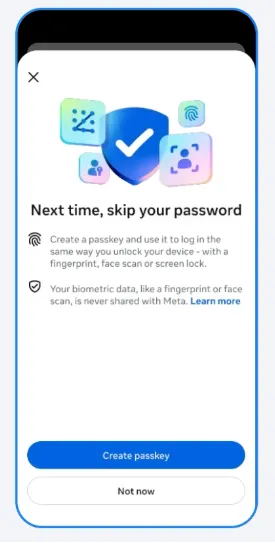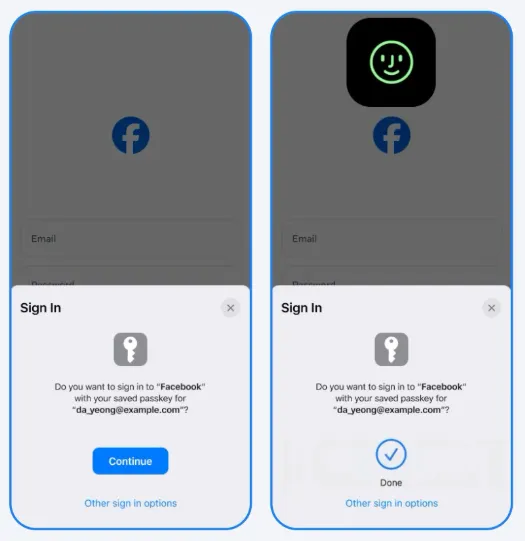Facebook Embraces Passkeys in Major Step Toward Password-Free Security
 Adshine.pro06/20/202562 views
Adshine.pro06/20/202562 viewsFacebook’s adding an extra level of log-in security, by enabling users to log in via Passkeys, which will provide another way to access your account without relying on passwords, or other less secure means.

Meta is taking another step toward fortifying user security across its platforms by introducing support for passkeys, a next-generation login method that leverages biometric authentication like fingerprint and facial recognition—without ever transferring your actual login credentials.
Passkeys operate via cryptographic key pairs, storing login data securely on your device. This decentralized approach reduces vulnerability to phishing attacks and data breaches, as there’s no password to steal or intercept. The technology has been widely endorsed by cybersecurity experts as a more secure and user-friendly alternative to traditional logins, and it’s increasingly being adopted across the tech landscape.
Now, Meta is bringing this technology into the Facebook and Messenger ecosystems.
“Passkeys will soon be available on iOS and Android mobile devices for Facebook, and we will begin rolling out passkeys to Messenger in the coming months,” the company announced in a recent update.
Crucially, once a passkey is set up for Facebook, the same credentials will seamlessly carry over to Messenger when the feature is enabled—eliminating the need for redundant logins and further simplifying the user experience.
Beyond logins, Meta plans to expand passkey functionality into its broader payments and privacy ecosystem. Users will be able to securely autofill payment information via Meta Pay, streamlining checkout while keeping financial data shielded. Passkeys will also be employed to safeguard encrypted message backups, reinforcing privacy protection in Messenger’s end-to-end encrypted conversations.
This move underscores Meta’s evolving approach to platform security—less about reactive defenses and more about building in proactive, frictionless safeguards.
As phishing schemes grow more sophisticated and consumers demand simpler yet stronger login options, passkeys represent a promising path forward. And with Meta joining the ranks of Apple, Google, and others in adopting the technology, the passwordless future may be closer than we think.

While Meta may be a little late to the party compared to competitors like X (formerly Twitter), TikTok, and LinkedIn—all of which integrated passkey support in 2023—it’s a welcome and necessary step toward modernizing its authentication systems in an era of increasing cybersecurity threats.
With account hijacking, phishing schemes, and credential stuffing attacks on the rise, offering users a frictionless, secure alternative to traditional logins is no longer optional—it’s essential. And for a platform like Facebook, which holds not only social data but payment information and business tools for millions of users, the stakes are especially high.
Once enabled, users can navigate to the Accounts Center in their Facebook settings to activate their passkey. From there, a biometric authentication method—such as Face ID or a fingerprint scan—will serve as your login going forward. Importantly, Meta confirms that legacy login options like passwords will remain available, ensuring accessibility across devices that don’t yet support passkey tech.
“You’ll still be able to use other authentication methods, such as your password, to access your account,” Meta noted, offering flexibility without compromising security.
This move also aligns Meta with the broader industry trend toward passwordless authentication, a shift driven in part by the FIDO Alliance, a consortium of tech giants promoting secure login standards. By joining this movement, Meta helps pave the way for a future where data breaches caused by weak or reused passwords become relics of the past.
In summary, while not groundbreaking, the introduction of passkeys is an important update that brings Facebook into line with its peers, while giving users a more secure and user-friendly way to protect their accounts. With the integration expanding to Messenger and other Meta services in the months ahead, users should expect a more cohesive, secure, and modern authentication experience across the Meta ecosystem.
📢 If you're interested in Facebook Ads Account, don't hesitate to connect with us!
🔹 https://linktr.ee/Adshinepro
💬 We're always ready to assist you!
